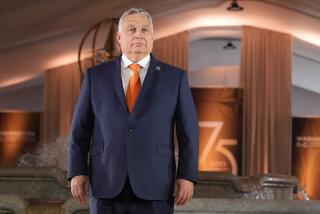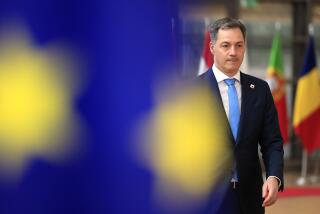Russia reduces election observers from Europe
- Share via
MOSCOW — Russia has sharply reduced the number of European monitors permitted to observe upcoming parliamentary elections and has imposed restrictions that may impede the ability of opposition parties to run successful campaigns, one of Europe’s main monitoring delegations said Friday.
An assessment in advance of the Dec. 2 vote by a delegation of the Parliamentary Assembly of the Council of Europe raises questions about whether political opponents can counter President Vladimir V. Putin’s government and its pervasive control over parliament and the electronic media.
The delegation cited concerns that election laws adopted in 2005 raised the threshold too high for opposition parties seeking to enter parliament.
The law requires parties to win at least 7% of the total vote and collect signatures in at least 20 regions of the country, and it prohibits electoral coalitions -- standards significantly more stringent than in most other European nations.
And while election laws provide for equal media access for all parties, Putin’s ruling party in effect dominates the airwaves, “which puts the opposition parties at a disfavor,” the delegation said in a statement.
Eleven parties are on the ballot for 450 seats in the lower house of parliament. In 2003, two main challengers that favored greater democracy and free markets were shut out because they failed to achieve a threshold then set at 5% of the vote. They alleged the campaign was unfair.
Luc Van den Brande, who headed the Council of Europe delegation, said the number of foreign observers invited has shrunk from 1,163 in 2003 to just 300.
Russia has accused foreign election observers of having political motivations. It says it is unfair to expect it to host large numbers of monitors when other countries in Europe and the U.S. have far fewer.
There were only 12 European observers at the recent parliamentary elections in Poland, 11 in France and 18 in the U.S., Russian officials said.
“Frankly, we don’t understand why they send just a couple of observers to monitor elections in certain countries and close their eyes on violations there, but come as a huge crowd to a different country and make totally different conclusions,” Igor Borisov, a member of Russia’s Central Elections Commission, said in an interview.
The Russian Foreign Ministry reacted sharply to recent State Department criticism that the curtailing of European observers was “inappropriate.”
“Such comments, which are utterly baseless, only go to show that certain quarters in the West are allergic to the sovereign character of Russia’s democratic system,” the ministry said in a statement.
The elections for the State Duma are among the most important in recent Russian history because they come on the eve of what are expected to be Putin’s final months in office.
They mark the first time Russia has moved to impose serious restrictions on the number of outside observers monitoring the polls.
The Organization for Security and Cooperation in Europe, Europe’s principal election watchdog, has not yet received visas for preelection monitoring despite repeated requests, and has been told it can send only 70 representatives, compared with 400 dispatched for the 2003 balloting.
“This puts us in a very difficult position, because time is indeed running very short,” OSCE election spokeswoman Urdur Gunnarsdottir said in a telephone interview.
“For us, it’s not only the number of people, it’s maybe more a question of the principle that the invitation is being restricted, and that we’re not able to deploy people in time to monitor the campaign,” she said.
Putin this year complained about what he called the OSCE’s increasing interference in the “internal affairs” of member states, and said the organization is being transformed into a “vulgar instrument designed to promote the foreign policy interests of one or a group of countries.”
Van den Brande said at a news conference in Moscow that the Russian government should double the number of electoral observers allowed from his organization.
“About the 300 observers invited, our position is it’s not enough, and I insisted to invite more observers than is the case today,” he said.
Nothing has indicated that the elections will not be free, Van den Brande said, but he added that the issue of making them fair also requires a level playing field.
--
Times staff writer Sergei L. Loiko contributed to this report.
More to Read
Sign up for Essential California
The most important California stories and recommendations in your inbox every morning.
You may occasionally receive promotional content from the Los Angeles Times.













